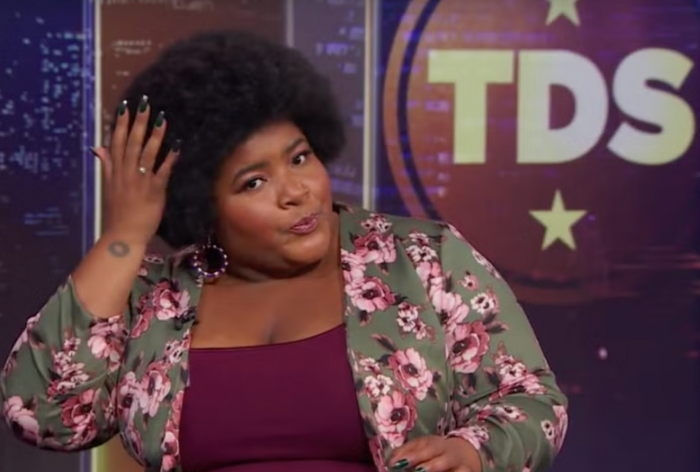

‘She Said’ in a Post Depp-Heard World
By Isabel Parigi | Film | August 3, 2022 |
By Isabel Parigi | Film | August 3, 2022 |

She Said, a dramatization of the New York Times investigation into Harvey Weinstein’s pattern of sexual abuse (set to release in November), comes at a time where she said means remarkably little … at a time where what she proved means even less … and a time where victims of abuse are both legally and socially incentivized to stay silent.
I’m sure She Said will be a thoughtful dramatization of Jodi Kantor and Megan Twohey’s investigation into the decades of sexual abuse by Harvey Weinstein and the system that helped cover his tracks. As adaptations go, I understand that five-ish years after the fact makes enough sense.* I do not understand, however, what the point of the movie is besides completing the prestige journalism cycle and cementing Weinstein’s abuse within the canon of his own medium.
It’s not one for one, but it feels a lot like making All the President’s Men while an unbothered Nixon served out his second term. Again, it’s not a perfect comparison, but the legacy of #MeToo, post-MeToo, is dependent on what comes next. Will its weight remain with right-wing reactionaries or move forward to deliver material equality and justice? I’m not an Oscar winning producer nor am I a film theory expert. Maybe the movie will at last demonstrate concrete ways for corporations and middlemen everywhere to identify abusive behavior and stop it. Maybe, it will inspire other women to come forward … guarantee that no matter how powerful, how famous, how well connected, no abuser is above the law … Ha!
Not only does the film premier ten days after what may be a brutal Midterm Election (November 18), it will come at the near six-month anniversary of the final days of the Depp-Heard trial. So yes, the screenwriter was right, including allusions to the myriad implications of the original investigation. But in the context of today - Depp’s soaring profile, vitriolic anti-Heard propaganda, and a GOP-backed framework for replicating revenge-porn by trial - the trailer reads more self-congratulatory than honest retrospective.
Caroline Walsh-King’s essay “We Don’t Want To Believe” provides one of the best diagnoses of the Depp-Heard trial, post-MeToo media, and mainstream coverage of sexual assault, that I have read:
Let me be crystal clear. As a culture we have never ever given victims of assault, abuse, or harassment even a fraction of the support and restitution that they deserve and need. Not during #MeToo, not now, not ever. We’ve given them plenty of media coverage. We interview them and we watch them and we make movies and TV shows about them. We put them onstage at the Oscars so that we can publicly absolve ourselves of our complicity in their suffering…
I posit: We also make Oscar-bait prestige films about them and the trauma of coming forward. But, in 2022, we - especially the Heard-support-shy ranks of Hollywood - should not get to pretend that the Weinstein case, and the #MeToo era that followed, solved abusive behavior in entertainment or across society.
Walsh-King goes on to challenge our rose-colored #MeToo glasses, listing four men accused of sexual harassment or domestic violence, and one industry creep, who were each nominated for MAJOR awards in 2018 … the year every woman wore black to the Golden Globes to show solidarity with the cause. “This is the year we believed women?” she asks. “This is the year men were oh so scared?” The point being, even in the glory days of #MeToo, nothing materially changed — just a genre attributed to the ensuing trial by media.
Later, Walsh-King asks readers to think about how we have participated in exploitation … How we, to some extent, are only comfortable administering justice retroactively, ideally through a trending docuseries with high production value. Britney Spears, Monica Lewinsky, Pamela Anderson - they are all subjects of 2021/22 adaptations of their abuse with varying degrees of consent and involvement … many of which are up for awards right now.
After I initially watched the She Said trailer, I couldn’t help but think about the 2018 Emmy Awards … particularly, the poorly received opening number, “We Solved It!”: a sardonic and jazzy song mock-celebrating how, based on the awards’ historically diverse nominations, television and Hollywood solved its lack of diversity.
They [Hollywood], of course, did not in fact “solve it” [diversity], a point more than driven home, when, by the end of the night the historic nominations resulted in only three non-white winners. That opening number has been, nonetheless, on my mind since first watching the She Said trailer. Where at least the opening number-regardless of very fair criticism re: its tone - was poking fun at the self-congratulatory “historic achievement” assigned to the awards, the upcoming movie seems completely self-serious in its attempt to paint a coming of age story for the #MeToo Movement. Personally, I can’t stomach any more proof. Towards the end of the Emmys opening number, RuPaul delivers Kenan Thompson a phone call: Thompson one way-responds into the faux-receiver:
“Hello.”… “Oh, we did not solve it?!”… “I see.”… “Long way to go.”… “Okay.”… “Cart before the horse.”… “Ya, okay, very good.”… “Spikin’ the ball at the fifty yard line.”… “Yeah sure, tha-that’s right, that’s right.”… “Well I appreciate your call. Thank you very much.”
Someone needs to deliver Universal Pictures a similar message ASAP. She Said producer, former husband and boyfriend to victims of Weinstein’s abuse, and notable Weinstein-threatener turned Weinstein-collaborator, Brad Pitt would likely also benefit from one of these calls.
Midway through the She Said trailer, we see a female source, clearly in pain, say, “This is bigger than Weinstein. This is about the system protecting abusers.” The muted tones, the dramatic music, the red New York Times staircase - representing a sturdy bastion of freedom of speech … It feels like it’s setting up a tale of journalistic triumph over injustice, of how the system can work to expose evil and speak truth to power. Given the events of this summer - given that it is more clear than ever that the legal system protects and empowers abusers - this film feels like Hollywood putting a bow on top of a shit sandwich and trying to convince me to get excited about eating it.
The thing is, the system does protect abusers. And yes, the New York Times investigation is an important story that deserves to be told, and the brave women who came forward deserve to be remembered. I’m just personally skeptical that a 2022 prestige film is the vehicle to do so. I’m skeptical because the Depp-Heard trial, as proven by both the court and hordes of militant Depp supporters, is a blow to #MeToo - if not the anti-climactic reveal that the “man” behind the #MeToo curtain didn’t turn out to be the ally victims of abuse need or deserve (to paraphrase the previous excerpt from Walsh-King).
To my knowledge, neither of the movie’s stars, Carey Mulligan and Zoe Kazan, have voiced opinions or shown support one way or another regarding the Depp-Heard trial. They are starring in the movie that purports to be the origin of the movement, but either have yet to or don’t plan on weighing in? I don’t love it. But, I’m not in the habit of demanding perfection from celebrities. What about the Pulitzer Prize-winning journalists they are playing? To my knowledge, Megan Twohey has not commented on the case. And Jodi Kantor was on CBS Mornings to discuss the trial and what it means for #MeToo, only offering vague support to victims silenced by their abusers - but no concrete support of Heard. In fact she seemed skeptical Heard counted as a #MeToo case. It seems, from the outside, like the movie about the #MeToo movement is being prioritized over the stakes of the actual movement.
The overall tone of She Said feels incompatible with the society capable of the cruelty we witnessed during the Depp-Heard trial. Even assuming the scope of the movie is just the investigation—revealing the yes men and fixers who allowed these crimes to become commonplace—it feels slimy to me that no one associated with the project has spoken up in support of Heard. Production (or marketing or the studio) really saw no similarities between the highly publicized and polarizing defamation case, and the film they are teasing—about a “system protecting abusers”—that they stand to profit from? Or, the more likely answer: They do see the similarities and fear Depp-fans connecting the movie about the movement to the trial that the movement arguably helped inspire. I wish the people behind this movie were willing to back up their inspirational claims/trailer sound-bites (“This is bigger than Weinstein.”/ “I want my voice back.”) with action that extends beyond the literal world of the film.
*1972, Watergate; 1974, All the President’s Men (book); 1976, movie adaptation. Versus, 2017, initial NYT investigation; 2019, She Said (book); 2022 movie adaptation.
Isabel is a writer based in New York. You can follow her on Substack and Twitter.
← Aaron Rodgers' New Tattoo Reveals How Deep the Brain Worms Have Burrowed | Alex Jones' Self-Implosion Is the Internet's Best Courtroom Drama →
More Like This
The Problem with Peacock's 'Apples Never Fall' Is Its Infuriating Ending [Spoilers]
David Dastmalchian's 'Late Night with the Devil' Takes the Late-Night Wars into the Horror Genre
Review: 'Damsel' Needs Saving from the Soulless Netflix Formula
'The Girls on the Bus' Is 'The West Wing' Crossed with a Live, Laugh, Love Poster
Manifest Destiny Made Flesh: 'Ravenous' Turns 25

The Experiment With Diversity Is Over in Late Night TV, Suggests Dulcé Sloan
Jordan Klepper Got A "Glimmer Of Hope" From A Trump Supporter
Leave Josh Peck Alone, Says Drake Bell in the Wake of 'Quiet on the Set' Revelations
Sophie Turner Has ‘Reactivated’ Her Divorce From Joe Jonas
Is Aaron Taylor-Johnson The Next James Bond?
Sydney Sweeney Is All Business When It Comes to ‘Madame Web’: ‘That Film Was a Building Block’
More Like This
The Problem with Peacock's 'Apples Never Fall' Is Its Infuriating Ending [Spoilers]
David Dastmalchian's 'Late Night with the Devil' Takes the Late-Night Wars into the Horror Genre
Review: 'Damsel' Needs Saving from the Soulless Netflix Formula
'The Girls on the Bus' Is 'The West Wing' Crossed with a Live, Laugh, Love Poster
Manifest Destiny Made Flesh: 'Ravenous' Turns 25
Reviews